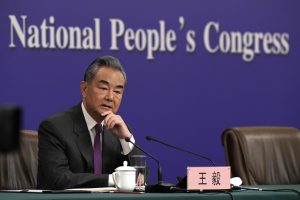On March 11, the Chinese government concluded the “Two Sessions,” the annual meeting of the National People’s Congress (NPC), China’s rubber-stamp parliament, and the Chinese People’s Political Consultative Conference (CPPCC), an advisory body. As the Chinese Communist Party asserts greater influence over state governance, the Two Sessions has become less of a platform for original policymaking and more of a venue for conveying the directives of the party leadership.
In keeping with convention, the Two Sessions focused primarily on domestic issues such as the economy and social policy. Nonetheless, the Government Work Report, delivered by Premier Li Qiang, highlighted that domestic policy and foreign policy are becoming increasingly intertwined. Li stated that, over the last 12 months, “the external environment exerted a more adverse impact on China’s development.”
Amid rising geopolitical tensions, China’s foreign policy priorities include hardening the economy against global disruptions, deepening ties with the developing world, stabilizing relations with the West, and playing a more active role in regional crises. In his press conference, Foreign Minister Wang Yi signaled that Beijing will continue to shape an international environment conducive to economic development.
Beijing recognizes that global instability is inflicting pressure on the domestic economy. According to the Work Report, “geopolitical conflicts” are becoming “more acute” and “protectionism and unilateralism” are on the rise. Undoubtedly, the government is concerned about the spillovers from the Russia-Ukraine war, crises in the Middle East, and China-U.S. tensions.
To respond to these risks, Li stressed that China is playing a “constructive role in addressing international and regional hotspot issues.” Last year, Beijing took several token measures to ease global tensions: sending Special Representative Li Hui to meet with officials in Moscow and Kyiv and pressing Iran to “restrain” the Houthis in Yemen. Wang reminded the press that China helped facilitate “reconciliation between Iran and Saudi Arabia.” Even so, many analysts argue that China is acting as a “free-rider” in the Middle East and providing “tacit support” to Russia in its war against Ukraine.
Economic headwinds have prompted the leadership to make a tactical shift toward stabilizing relations with the West. Wang noted that there “has been progress in improving relations” with the United States since Chinese President Xi Jinping met U.S. President Joe Biden in San Francisco last November. During that meeting, China agreed to reopen military-to-military channels and stem the flow of fentanyl precursor exports, two key demands of Washington. Also, last November, Beijing lifted its economic embargo on Lithuania, a key sticking point in China-EU relations.
Despite attempts to shore up diplomatic ties, economic disputes between China and the West persist. The European Union recently announced that it found “sufficient evidence” to impose antidumping duties on electric vehicles from China. In February, Biden signed executive orders to investigate the national security risks posed by Chinese-made cranes and connected vehicles. This week, the U.S. House of Representatives passed a bill to remove TikTok from U.S. app stores unless its parent company, China-based ByteDance, divests from the platform.
To reduce external vulnerabilities, Beijing is pouring state-guided investments into science and technology under the banner of “new productive forces.” In 2023, Chinese banks diverted substantial amounts of credit from the real estate sector toward advanced manufacturing, particularly industries like semiconductors and electric vehicles.
These investments have both economic and security implications. In a meeting on the sidelines of the Two Sessions, Xi told representatives of the People’s Liberation Army (PLA) that “strategic capabilities in emerging fields are an integral part of… national security and military initiative.”
Beijing is also hedging against economic frictions with the West by deepening ties with the developing world. In 2023, China promoted head-of-state diplomacy at the annual meetings of the BRICS and the Shanghai Cooperation Organization, as well as the inaugural China-Central Asia summit. Wang emphasized that the BRICS, in its expanded form, is “a manifestation of the collective rise of the ‘Global South.’”
Even as Beijing strengthens relations with the developing world, the government is seeking to attract capital and know-how from advanced economies. In 2023, foreign direct investment (FDI) flows to China fell to the lowest level in three decades. Nonetheless, China’s state media emphasize that investment from France, the United Kingdom, and the Netherlands rose by 84.1 percent, 81 percent, and 31.5 percent, respectively.
To encourage greater investment flows, the NPC announced several new measures: shortening the negative list; relaxing market access in service industries; and removing investment restrictions in the manufacturing sector. Foreign investment is unlikely to return, however, without genuine efforts to create a more favorable business environment. Recent actions such as revisions to the Anti-Espionage Law and raids on multinationals have exacerbated China’s already deteriorating investment climate.
On Taiwan, the Two Sessions indicated little substantive policy change. News reports suggested that Li introduced a more hardline policy by omitting the words “peaceful reunification” from the Government Work Report. However, on the second day of the Two Sessions, Xi reiterated China’s priority of “advancing peaceful reunification” in a session with CPPCC members.
In the year ahead, China will likely continue to shore up its external environment in the interest of domestic stability. But there is no guarantee that this strategy will be successful. In light of China’s myriad challenges, Li stressed that reaching this year’s targets “will not be an easy task.”

































